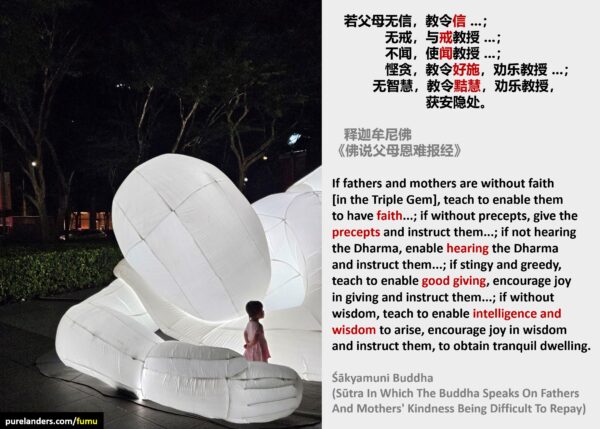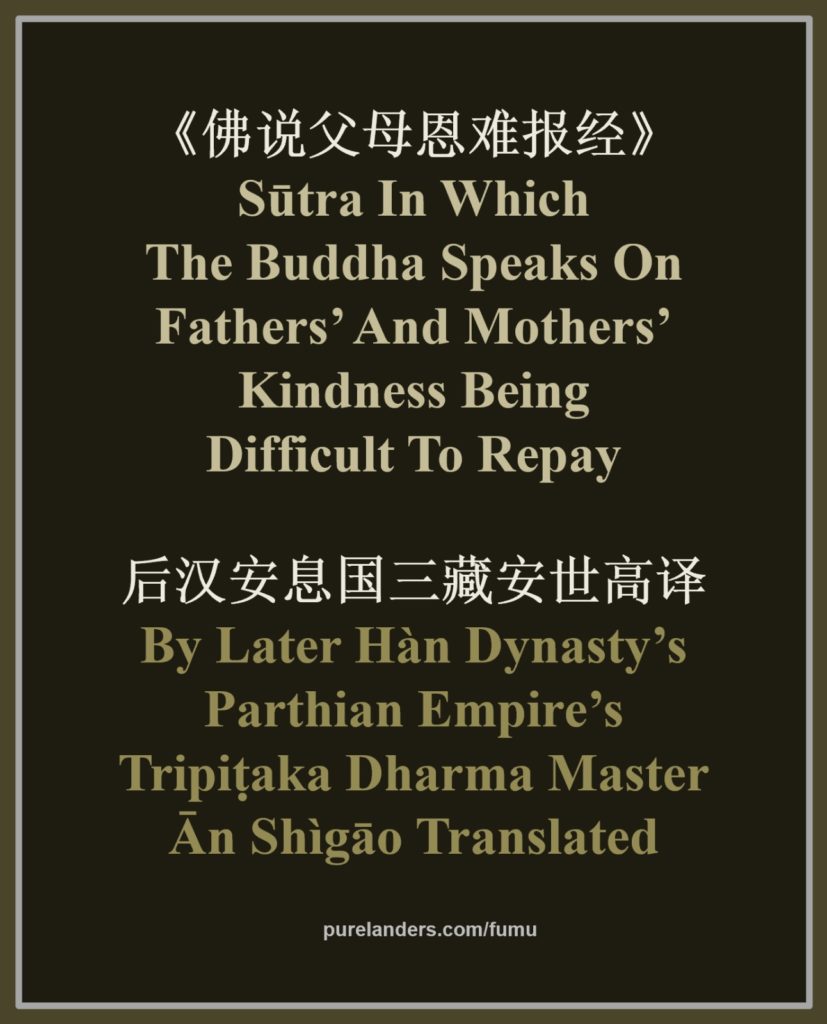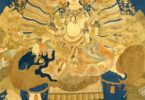


《佛说父母恩难报经》
Sūtra [In Which The] Buddha Speaks [On] Fathers [And] Mothers’ Kindness [Being] Difficult [To] Repay
[This is not be confused with a spurious ‘scripture’ with an almost same title, as explained in the last note below.]
后汉安息国三藏安世高译
[By] Later Hàn Dynasty’s Parthian Empire’s Tripiṭaka [Dharma Master] Ān Shìgāo Translated [Into Chinese]
闻如是:一时婆伽婆在舍卫城祇树给孤独园。
[That] heard [was] thus: [At] one time, [the] Bhagavān [i.e. Blessed One] [was] at Śrāvastī City’s Jeta Grove [And] Giver-[To-The-]Lonely Garden.
[Note 1: This is where the Buddha also taught the Pure Land teachings in the Amitābha Sūtra《阿弥陀经》.]
尔时世尊告诸比丘:「父母于子,有大增益,乳餔长养,随时将育,四大得成。
[At] that time, [the] World-Honoured [One] told all [the] Bhikṣus, ‘Fathers [and] Mothers, for [their] children, have [given them] great gains, [by] suckling, feeding, nurturing, [and] at all times educating [them, with their] four great [elements] properly accomplished.
[Note 2: Without initial parental physical support of drink, food, clothing and shelter to nurture our body (of its [1] earth, [2] water, [3] fire and [4] wind elements), along with mental support of teaching us the various ways of the world, we would not be able to grow up well, to be able to understand and practise the Dharma now. As reciprocation out of gratitude, we too should support our parents with the above when they grow old or fall sick, and are unable to support themselves.]
右肩负父、左肩负母,经历千年,正使便利背上,然无有怨心于父母,此子犹不足报父母恩。
[If on the] right shoulder carrying [one’s] Father, [and on the] left shoulder carrying [one’s] Mother, going through [a] thousand years, even though [they have their] convenience on [one’s] back, however without having [the] resentful mind for [one’s] Father [and] Mother, this child still cannot adequately repay [the] Father [and] Mother’s kindness.
[Note 3: Even with much gladly endured physical toil and inconveniences for our parents’ convenience (of urination and defecation), this will still not be enough to repay even a little of their great kindness. Even the most lavish physical care offered cannot repay this. Even the best physical forms of support, such as clothing, food and shelter eventually expire, and are unable to be carried over to the next life, while unable to lead to lasting happiness. Thus, spiritual support for liberation is crucial.]

若父母无信,教令信,获安隐处;
If Fathers [and] Mothers [are] without faith [in the Triple Gem], teach [to] enable [them to have] faith, [to] obtain tranquil dwelling;
[Note 4: It is with connecting of our parents with the Triple Gem, by them taking sincere refuge in it for guidance, that they can dwell tranquilly now and in the next life. With the most tranquil dwelling possible only with liberation, it is with guiding of them towards liberation, that we can fully repay their kindness. As it is difficult to guide them to liberation directly, there should be guidance to reach Pure Land, where complete liberation is guaranteed. It is there, that the Triple Gem will be encountered in person, where they will be able to practise, to become one with the Triple Gem.
Note 5: While there can be making of offerings to the Triple Gem and doing of various wholesome deeds (e.g. by going veg[etari]an, liberating animals, reciting, copying and printing sūtras) on behalf of our parents, so as to create meritorious virtues to dedicate to them, there should also be sharing of the Dharma directly with them, to guide them to create meritorious virtues, and grow in wisdom personally. This is important as without personal accumulation of meritorious virtues and wisdom, they cannot attain liberation.]
无戒,与戒教授,获安隐处;
[if] without precepts, give [the] precepts [and] instruct [them, to] obtain tranquil dwelling;
[Note 6: If our parents lack understanding of good and evil, of karmic cause and effect, they should be guided with principles of the precepts to understand them well, as as to avoid creating suffering, and to practise good, for the welfare of themselves and others they might affect.
Note 7: The basic Five Precepts (五戒) to [1] avoid killing, [2] stealing, [3] sexual misconduct, [4] lying and [5] intoxicants (不饮酒) should first be taught, for at least securing the possibility of having a human rebirth. Qualified monastics can directly confer the precepts.
Note 8: The Ten Good Karmas (十善业) should thereafter be encouraged too, which includes [1] not killing (不杀生), [2] not stealing (不偷盗), [3] not having sexual misconduct (不邪淫), [4] not having false speech (不妄语), [5] not having double-tongued (or equivocal) speech (不两舌), [6] not having harsh (and vulgar) speech (不恶口), [7] not having useless (or frivolous) speech (不绮语), [8] not having greedy desires (不贪欲), [9] not having anger (不嗔恚) and [10] not having evil (or deluded) views (不邪见).
Note 9: When they are more ready later, there can be commitment to the Eight Precepts (八戒) occasionally or regularly, for training towards self-liberation. (See Related Article for more on the Eight Precepts.)
Note 10: Most ideally, if further ready, there can be learning about, for committing to the Bodhisattva Precepts (菩萨戒), for moral training towards the liberation of all beings, with minimising of all evils and maximising of all good in conduct.]
不闻,使闻教授,获安隐处;
[if] not hearing [the Dharma], enable hearing [the Dharma and] instruct [them, to] obtain tranquil dwelling;
[Note 11: If our parents do not know how to learn the Dharma, or are uninterested, they should be guided to learn, skilfully and enthusiastically.]
悭贪,教令好施,劝乐教授,获安隐处;
[if] stingy [and] greedy, teach [to] enable good giving, encourage joy [in giving and] instruct [them, to] obtain tranquil dwelling;
[Note 12: If our parents are miserly and covetous, they should be joyfully guided to be generous appropriately. Giving (布施) can be practised in three ways, in terms of the [1] material (财施), such as cash and kind, with volunteer efforts, [2] fearlessness (无畏施), such as by offering advice and consolations, and with [3] the Dharma (法施), which is the greatest gift, that leads to liberation.]
无智慧,教令黠慧,劝乐教授,获安隐处。
[if] without wisdom, teach [to] enable intelligence [and] wisdom [to arise], encourage joy [in wisdom and] instruct [them, to] obtain tranquil dwelling.
[Note 13: If our parents are ignorant or deluded, they should be joyfully guided to become wise. With addition of [3] patience (忍辱) and [4] diligence (精进), to [2] upholding precepts (持戒), [1] generosity (布施) and [6] wisdom (般若: Prajñā) above, and with [5] samādhi (禅定: concentration) below, if all in the Mahāyāna sense, the Six Perfections (六度) for Buddhahood are thus complete.]
如是信如来、至真、等正觉、明行成为、善逝、世间解、无上士、道法御、天人师、号佛、世尊教,信法教授,获安隐处。
Thus [with] faith [in the] [1] Thus Come [One], [2] Utmost True [One], [3] Equally [And] Rightly Awakened [One], [4] Knowledge [And] Practice Accomplished [One], [5] Well Gone [One], [6] World-Knowing [One], [7] Unsurpassed One, [8] Tamer [With The] Path’s Dharma, [9] Heavenly [And] Human [Beings’] Teacher, [also] named [10] [the] Buddha, [the] World-Honoured [One’s] teachings, [for] faith [in the] Dharma, instruct [them, to] obtain tranquil dwelling.
[Note 14: The numbered are the ten names (or epithets) of the Buddhas (佛陀十号), here listed to emphasize faith in the Buddha(s) due to his/their supreme nature. This section is to encourage faith in the Buddhas, the first aspect of the Triple Gem.]
诸法甚深,现身获果,义味甚深。
All [the Buddhas’] Dharma [teachings are] extremely profound, [with this] present [life’s] body [able to] obtain [their] fruits, [with their] meanings’ flavour extremely profound.
[Note 15: The fruits of Dharma practice can be personally attained in this life with adequate diligence, for sharing the flavour of liberation tasted with our parents and others. However, as we are currently in the Dharma-Ending Age (末法时期), as taught by the Buddha, the viable Dharma practice for liberation is the Pure Land Dharma Door (净土法门). Thus, should it be personally mastered and shared. This section is to encourage faith in the Dharma, the second aspect of the Triple Gem.]
如是智者,明通此行,教令信圣众。
Thus, those wise, clearly understanding these practices, [should] teach [to] enable faith [in the] noble assembly.
[Note 16: Also due to this Dharma-Ending Age, the key noble assembly to inspire faith in, that all can most easily aspire to meet and join by the end of this life, is that of the lotus pond’s ocean-wide assembly with (Amitābha) Buddha and Bodhisattvas (莲池海会佛菩萨) in his Pure Land. This section is to encourage faith in the Saṃgha, the third aspect of the Triple Gem.]
如来圣众甚清净,行直不曲,常和合,法法成就,戒成就、三昧成就、智慧成就、解脱成就、解脱见慧成就。
[The] Thus Come [One’s] noble assembly [is] extremely pure, [with] practices upright [and] not crooked, constantly harmonious, [with] every Dharma [teaching] accomplished, [with the] [1] precepts accomplished, [with] [2] samādhi accomplished, [with] [3] wisdom accomplished, [with] [4] liberation accomplished, [and with] [5] liberation’s knowledge [and] wisdom accomplished.
[Note 17: The noble assembly includes the Triple Gem (of the Buddhas, Dharma and Saṃgha) collectively, as it is the Saṃgha community of noble practitioners (with various fruits of enlightenment), led by the Buddha (who is interconnected to all other Buddhas), who practise to perfect all Dharma teachings. The list of first three accomplishments are called the Threefold Learning (三学) for self-liberation, while the list of all five accomplishments are called the Five-Part Dharma Body (五分法身) realised with complete liberation as Buddhas.]
所谓圣众——四双八辈,是谓如来圣众,最尊最贵,当尊奉敬仰,是世间无上福田。
[The] so-called noble assembly – [are the] Four Pairs [With] Eight Kinds, [who] are called [the] Thus Come [One’s] noble assembly, [the] most honoured, most precious, [who] should [be] venerated reverently, [as they] are [the] world’s unsurpassable blessing field.
[Note 18: The Four Pairs With Eight Kinds (四向四果: Four Directions And Four Fruits) are [1] those going towards and [2] those with the fruit of Stream-Enterers (预流向,预流果), [3] those going towards and [4] those with the fruit of Once-Returners (一来向,一来果), [5] those going towards and [6] those with the fruit of Non-Returners (不还向,不还果), and [7] those going towards and [8] those with the fruit of Arhats (阿罗汉向,阿罗汉果). All going towards and with the various 52 fruits of Bodhisattvahood are by extension included too. Together with the Buddhas, they form the unsurpassed field for planting great blessings, to reap great fruits.]
如是诸子!当教父母行慈。
Thus, all children! [You] should teach [your] Fathers [and] Mothers [to] practise loving-kindness.
[Note 19: ‘All children’ refers to all of us as we are all with Fathers and Mothers, who should be taught how to practise [1] loving-kindness, [2] compassion, [3] rejoice and [4] equanimity, together called the Four Immeasurable Minds (四无量心) with our personal examples, to benefit all sentient beings, who had also been our loving parents in many interconnected past lives. Doing so is to extend and complete filial piety – by guiding all past and present parents to liberation most swiftly, with reaching of Pure Land. This is the easiest way to truly repay the profound kindness of all beings.]
诸比丘有二子:所生子、所养子,是谓比丘有二子。
All Bhikṣus [are] with two [kinds of] children: [1] those brought up children, [and] [2] those adopted children. These [are] called Bhikṣus [as] two [kinds of] children.
[Note 20: Even monastics were either brought up or adopted as children. In either case, all should practise filial piety with offering of the Dharma, as our parents’ kindness is the first and definitely among the most profound in our lives.]
是故诸比丘!当学所生子,口出法味。 如是诸比丘,当作是学。」
Therefore, all Bhikṣus! [You] should learn, [to be like] those [well-]brought up children, [to be with] mouths speaking [of the] Dharma’s flavour [to your parents]. Thus, all Bhikṣus, [you] should practise this learnt.’
[Note 21: We too should learn, from as young as possible, to think, speak and act, to joyfully benefit our parents with delights of the Dharma, so as to sooner interest them to learn and practise it. In this way, we should continually grow up to be spiritually stronger with the Dharma, so as to benefit even more. Even monastics should do this, what more laypeople.]
尔时诸比丘闻佛所说,欢喜奉行。
[At] that time, all Bhikṣus, [having] heard that [the] Buddha said, rejoiced [and] practised [accordingly].
[Note 22: We too should rejoice in these teachings and practise as taught by the Buddha.
Note 23: In summary, as the Pure Land Tradition’s 8th Patriarch Great Master Liánchí (净土宗八祖莲池大师) taught in his ‘Third [Volume Of] Essays [By The] Bamboo Window’《竹窗三笔》on spurious ‘scriptures’, there is a forged (伪造) ‘scripture’… titled ‘Fathers [And] Mothers’ Kindness [Being] Heavy…’ (父母恩重等), that feigns being by an ancient translator master’s name (假托古译师名). This has two harms (二害). First, people who do not have faith in the Buddha, seeing of this, thus extensively increase their slander by saying, ‘The Buddha’s speech is thus shallow [and crude], as from his “scriptures” can be known.’ (不信佛人见之,则弥增其谤:『佛言如是鄙俚,他经可知矣。』) Second, even if some have the mind of faith, but never before reading extensively the sūtras, seeing this talk of them being shallow, also give rise to doubt, (信佛人,徒具信心,未曾博览内典,见此鄙俚之谈,亦复起疑), stirring up their confusions and obstacles (动彼惑障).
全文 (Full Text):
《竹窗三笔》:伪造父母恩重经
(后学云栖寺沙门祩宏著)
有伪造二经者,题以父母恩重等言,中不尽同,而假託古译师名。吾友二人各刻其一。二友者,忠孝纯正士也,见其劝孝,而不察其伪也。或曰:「取其足以劝孝而己,似不必辨其真伪。」予曰:「子但知一利,而不知二害。一利者,诚如子言,劝人行孝,非美事乎?故云一利。二害者何?一者素不信佛人见之,则弥增其谤:『佛言如是鄙俚,他经可知矣。』遂等视大藏甚深无上法宝。重彼愆尤,一害也。二者素信佛人,徒具信心,未曾博览内典,见此鄙俚之谈,亦复起疑,因谓谤佛者未必皆非。动彼惑障,二害也。害多而利少故也。况劝孝自有大方便报恩经,及盂兰盆经,种种真实佛说者流通世间,奚取於伪造者?」]
Namo Amituofo : Translation and notes by Shen Shi’an

Related Articles:
如何尽大孝?
How To Have Great Filial Piety?
https://purelanders.com/2019/06/04/what-is-great-filial-piety
深度解析伪佛经《佛说父母恩重难报经》及其危害
https://fo.ifeng.com/a/20160226/41555683_0.shtml
《佛说父母恩难报经》
http://tripitaka.cbeta.org/zh-cn/T16n0684_001
How To Help The Deceased With The Triple Gem
(A Summary Of The Ullambana Sūtra)
https://thedailyenlightenment.com/2019/01/how-to-help-the-deceased-with-the-triple-gem
What Basic Integrity & Gratitude Should We Have?
https://thedailyenlightenment.com/2010/01/what-basic-integrity-gratitude-should-we-have
Should We Be Good Children To ‘Bad’ Parents?
https://thedailyenlightenment.com/2024/07/should-we-be-good-to-bad-parents
八关斋戒仪轨 (受戒者用)
Eight Precepts Ceremony (For Precept Recipients)
https://purelanders.com/2018/06/29/eight-precepts-ceremony





